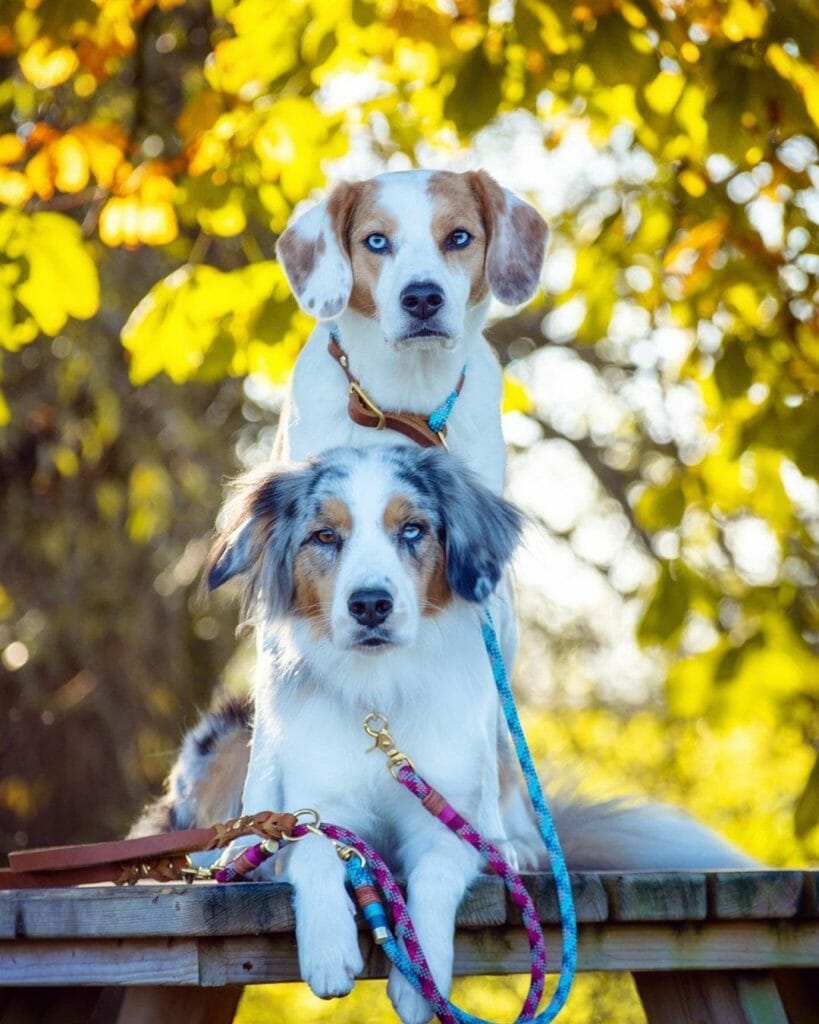One Dog Versus Two: All Pros and Cons
Many dog owners frequently ask if it is better to get a second dog. There is no absolute answer to this commonly asked question, but there are two things you have to consider first: Your first dog’s personality and your lifestyle as an owner. When you think both factors give off the green light, choosing the right breed for the second dog would be the next step.


It is not always necessary, however, to have two dogs in your house. There are pros and cons in case you want to own just one or go for two pups for your family. Deciding over how many dogs to go for can be hard. For those who are still undecided, this post will give you packed insights into what it will be like if you choose a certain number of dogs.
Table of Contents
Should All Dog Owners Have a Second Dog?


In most cases, having a second dog is the best thing to do for your first dog. If your current pet has no playmate, boredom may strike him and eventually, behavioral problems will occur, more so if he does not receive enough attention. Generally, having more dogs in the house creates a more positive and happy experience not just for you and your family but as well as for both of your pets.
Having a second dog does not apply to all owners, however, especially if they are not ready for this. Bringing a new pup home means another challenge, commitment, and responsibility to ensure he grows up well physically and mentally.
Pros and Cons of Having One Dog Only
Pros
- You won’t have to spend a lot on dog food. Let’s admit it, going for high-quality dog food or meals isn’t cheap. If you want to guarantee that your pooch lives healthily, it is important to invest in good products. Knowing that if you accommodate a second dog while at the same time cannot afford to increase the dog food budget, both of the dog’s well-being may be compromised.
- Training one dog can be easier. First-time dog owners are recommended to experience owning one dog first before opting to have a second one. This is because each dog would need to be trained thoroughly so they grow up to be well-behaved. They have to see first if they are capable of training their pets and are not overwhelmed by it.
- Giving your dog exercise drills won’t be a task. Every dog breed would require a different length and type of exercise to keep each of them active. By just having one pooch, it would be easier and more convenient to conduct exercise sessions for the dog instead of having two canines with different needs and energy levels.
- Lower expenses. Pet lovers who only have one dog to take care of obviously would spend less than those who own more than one. Dogs would need certain things so you may have to pay for grooming kits, toys, and dog walker or pet-sitter fees.
Cons
- Increased likelihood of developing separation anxiety. If you often leave the house and your dog gets left behind on his own, he may experience boredom. When this continues, onsets of behavioral issues may develop. You could end up going home to your place with ripped-up toys, pillows, and shoes or dirt on every corner, and perhaps get complaints from your neighbours saying your dog was loud all day.
- The dog would need more attention. Having no playmate at all means your dog only has you to spend most of his time with. Some dogs are attention-seekers and would demand frequent pets, hugs, and love from their owners. They may even initiate their favorite pastime game all the time to keep themselves from getting bored.
Pros and Cons of Having Two Dogs
- Both your dogs won’t end up getting bored. Playtime is important for all dogs. This contributes well to their need for socialization, overall being, and general development. However, this may demand a lot of your time during the day. Having two dogs though would ease your responsibility. As long as they are monitored, you can just let them enjoy their time in the yard.
- Training would be easier. If you already have one adult dog and you bring in a pup, training the new arrival will be easier. The older and mature dog will largely contribute to the lessons the puppy will learn. Young dogs mimic the old dog’s behavior and seek guidance from him. That means the new doggy will poop in the same place where the older one pooped.
- You are saving a new life. Thousands of dogs are in shelter homes waiting to be adopted and loved again. By taking the second dog from an adoption center, you are giving room for a new rescue dog.
- Double the amount of love! Dogs are indescribably amazing and being loved by not just one but two doggos gives a wonderful feeling. You’ll never stay lonely in your apartment nor worry about your safety because there are two dogs to alert and guard you all the time.
Ways to Determine if You Are Ready for a Second Dog


You might be enticed to get a second dog now, but honestly, having more than one dog is not for everybody. Aside from the needed resources and lifestyle, timing is also necessary. So, how would you know if you’re ready to head to the shelter home or contact a reputable breeder?
Here are 5 ways to do that:
- See if everyone in the family is on board with you. Pets included, the whole family must agree that it is time to get a second dog. If one or two objects to the decision, the more burdensome it would be. For example, in training a dog, every family member should be consistent in employing the rules of the house. On another note, see if your current pooch does not react aggressively to other canines and is rather sociable and friendly.
- You have extra time for a second dog. Having two pooches in the house would take a lot of your time, more so if the other is a new one. There will always be an adjustment period for the two of them and you have to ensure they receive equal amounts of your love, attention, and care so none of them ends up getting jealous.
- You have the resources. Two dogs equal more costs. Are you ready to increase the budget for food, training, and medical needs? If you are unsure about it and are unwilling to change your lifestyle to accommodate the needs of the new dog, then it’s much better to stick as a one-dog household.
- Your home has enough space. Dogs come in various sizes and depending on what breed you want, you may have to consider your home space. If you live in an apartment and you have realized you can take in one more little pooch, then it’s a good sign. However, if you’re into large ones like the Massive English Mastiff, a cramped-up place would tell you you’re not ready.
- You are willing to train the new dog. In order to maintain the positive vibes at home, the new pup needs direction on how to behave with his family and other pets. This means that you have to put in your time and effort in instilling the house rules, teaching him where to do his personal necessities, and what the crate is for. If your schedule is packed and dog training can’t be fit in, it is not time for a second dog.
How to Choose the Right Second Dog


Are you having a hard time choosing the right second dog? Although each dog is an individual and there are several factors to consider, the general rule is to determine the compatibility of your older dog with the targeted new dog according to:
- Age
- Sex
- Lifestyle
- Personality
You have to be well-versed regarding your first dog’s temperament and then you can spend some time with your prospective dog to know more about his personality. If you think that some traits the one dog or the other possesses are irreconcilable, you may either resort to just having one pet or look for a new targeted second dog who might get along with your first dog.
Only Stick With Having One Dog If:
- You don’t have time to take care of a second dog.
- You don’t have the financial means to support a new pet.
- You are content and happy with just having one.
- Your partner or family does not want you to.
- Someone in the family is allergic to dogs. Having too many pooches increases the risk of dog allergies. One is manageable.
- You have not found the best and compatible second dog yet.
